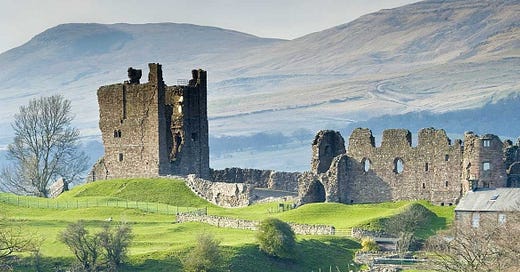Requiem…
The world is old. So old that the histories of men, dwarves, and even elves have long ago forgotten how it came to be or why it continues so. The truths behind the great civilizations of the ancient past are little more than myth and hearth-fire legend. Now, only mighty relics of stone and metal speak to the secrets told by the god-kings that once molded the land through war and witchcraft. The tools of their conquest are still scattered about the land, waiting to be unearthed by the fearless and foolhardy alike. At least, that’s how the sages tell it.
Today, there are whispers of terrible powers that roam the old forests and weathered ruins of the wild. Yet still, the dark tales of sorcery and destruction that keep farmers tending their fields and the common folk in doors at night have done little to dissuade the hungry adventurer.
———————————————————
So this is our 1st Edition, our ‘basic set’. With that in mind, we’re going to introduce somewhat complex rules in a simplified manner. To be sure, these rules can be expanded upon. But for now, we’ll keep it simple. Also, we’ll focus on a fantasy setting, even though this could be adapted to sci-fi, horror, a whichever genre you prefer.
Character Abilities: All player characters (PCs) have six ability scores. If you’ve played games like D&D, these will look familiar.
Strength (STR) - Raw physical might: pushing/pulling/lifting
Dexterity (DEX) - Agility, quickness, flexibility
Stamina (STM)- Overall endurance and physical ability to act over long periods of time
Intellect (INT) - Intelligence, ability to understand complex concepts
Wisdom (WIS) - Understanding of nature; experience, judgement
Charisma (CHAR) - Personality, Bearing
PCs also have two attributes: Fortitude and Willpower. These attributes are a passive defense against certain forms of attack.
Fortitude represents a PC’s overall health. It also acts as an armor class (AC) against physical maladies, disease, poisons, and death magic. Fortitude increases as the PC gains levels. At character creation, it is calculated this way: (Strength + Stamina)/2 then rounding. For example, a character with a Strength 15 and Stamina 14 would have a Fortitude score of (15+14)/2 = 14.5, rounded up to 15. This is also the PC’s starting Hit Points (which we’ll discuss later).
Willpower represents the PC’s overall mental stability. It acts as an armor class against mental damage and mind/emotion altering attacks. It also affects a magic-user’s total Spell Power. At character creation, it is calculated this way: (Intellect + Wisdom + Charisma)/3 then rounding. For example, a character with Intellect 14, Wisdom 13, and Charisma 13 would have a Willpower score of (14+13+13)/3 = 13.33, rounded down to 13.
——————————————————-
Character Races: Yes, we’re still using the word ‘race’. We could go with ‘species’ as well. Keeping things simple for our 1st Edition, there are five basic PC races: Elves, Half-Elves, Dwarves, Halflings, and Humans.
Elves, much like in Tolkien lore, are a mystical race. As they age (or level up) they gain occasional bonuses or talents, often associated with magic or other esoteric skills. They tend to live in forests or wooded areas, usually away from other races.
Half-Elves are rare and tend to live within the society they were raised, often by the mother and her family. They retain some of the magical traits found in their Elvish heritage.
Dwarves are a hardy people that often live in hills or underground. However, they’re not limited to those regions. They may be miners, hunters, farmers or craftspeople.
Halflings are are quite literally half-sized humans. They tend to be quick and stealthy. They live all over our world and mix well with the other races.
Humans are the most abundant race, just like in the real world. Consequently, they do most of the living, warring, and problem causing as well. They live almost anywhere on Requiem except in the most extreme conditions. Humans are talented and learn new skills quickly relative to the longer-lived races.
Racial Characteristics:
Elf: +2 to DEX, +2 to INT, -1 to STM, +1 to Blades & Bows rolls OR +1 to one Magic skill roll
Half-Elf: +1 to DEX, +1 to INT, +1 to WIS. +1 to one Magic skill roll
Dwarf: +2 to STR, +2 to STM, -2 to CHAR. +1 to any die rolls involving mining and survival
Halfling: +2 to DEX, - 2 to STR, +2 to stealth rolls, +1 to dodge rolls OR +1 to one Magic skill roll, -4 to Hit Points due to size
Human: +2 to a single ability score or +1 to two ability scores, +1 skill point per level, +1 talent at 1st level
Character Classes: There is only one: Adventurer. Other than that there are no other specific character classes. That is to say, there are no specific archetypes following a set progression of features that change and/or improve as a character gains levels. None but what each player carves out for his/her character.
Levels: A character’s level is a general representation of their power. Like most RPGs, the player characters (PCs) in our game increase in levels by gaining experience. This is done primarily by using their skills to overcome obstacles. This can be done via combat, solving puzzles, creating successful plans, non-player character (NPC) interaction, and/or anything that significantly moves their story forward. As a PC gains levels, they gain power through an increase in Hit Points, Skills, Attributes, and Talents.
Talents: These are inherent advantages that a PC starts with at 1st level. However, some talents can be discovered at higher levels. These talents are usually associated with a new skill, ability, or a racial/heritage bonus. Starting talents for our basic set include:
+1 to Fortitude
+1 to Willpower
+1 to one Combat Skill roll (Blades, Bows, Unarmed, etc)
+1 to one Magic Skill roll (Conjuration, Enchantment, Divination, etc)
+1 to any one Ability Score
+2 to a Secondary Skill roll
Skills: Skills are what make the PC who they are; A great swordsman, a powerful mage, a wise yet dangerous mystic…all of the above. Characters in our world can be anything and everything, to a point. It’s impossible to be great at everything. However, over time, it’s quite possible to be pretty good. Skills are purchased using points at first level and at every level gained thereafter.
Skills are separated into two (2) categories: Primary and Secondary. Primary skills are those that directly affect Combat and Magic. Secondary skills cover everything else. This isn’t to say that Secondary skills are less important. In fact, they can the difference between life and death in many a situation. They just tend to be used outside of combat. As we mentioned above, PCs gain skill points as they go up in levels. These points can be used to purchase new skills or increase an existing skill. Again, their is no set progression. A PC’s focus determines what their reality and how good they get in any particular area.
Primary skills:
Slash - Swords, knives, axes
Bash - Maces, hammers, staves
Bows - Bows, crossbows, slings/thrown weapons
Unarmed Combat - Brawling, Boxing, Martial Arts
Block - Stopping a weapon attack or unarmed attack using a shield or body part
Dodge - Evading an attack by moving out of the way before it lands
Parry - Deflecting a weapon attack using another weapon
Magic - Casting spells using various magical disciplines
————————————————————-
Next time we’ll talk a little more about Backgrounds, Secondary Skills, and build a sample character. We’ll also talk about character advancement, the cost of increasing skills, and how they work in gameplay.
Cover Photo - English Heritage
Mountain Range - Pixabay.com
Dwarf - Wikimedia






I love the elegance of combining AC and HP (and physical saving throws) into a single Fortitude score! I also think keeping six Attribute scores make sense. While sometimes it seems maybe like one too many, I feel like the three-score system of Cypher is too few.
Okay, you know I have Opinions about how race is handled in fantasy media. I think you're right to avoid the dodge of calling races "species," because the history of the two concepts has always been enmeshed, and if different kinds of humanoids can have children together, they pass the most basic and common of the twenty-some-odd definitions of species. Race is of course a made-up thing we came up with in the nineteenth century—so why not use it to distinguish made-up people?
I think where it gets problematic is when you attach essential differences in physical and intellectual abilities to race. To say *all* elves are smarter and quicker just because of their genetic inheritance seems deterministic, and any social scientist would say that differences within a particular group of people are greater than differences between groups (because our concept of the group is always an average or, let's be honest, a stereotype). Imposing penalties based on race seems equally if not more problematic.
So while I think it's helpful to allow players to bump ability scores, to give them more choices and derive enjoyment from crafting a character, why attach those bonuses to race? Could this be an early way for characters to start to specialize in your class-less system? "I'll be the kind that has trained to be extra good at Strength, Intelligence, and Charisma," for example?